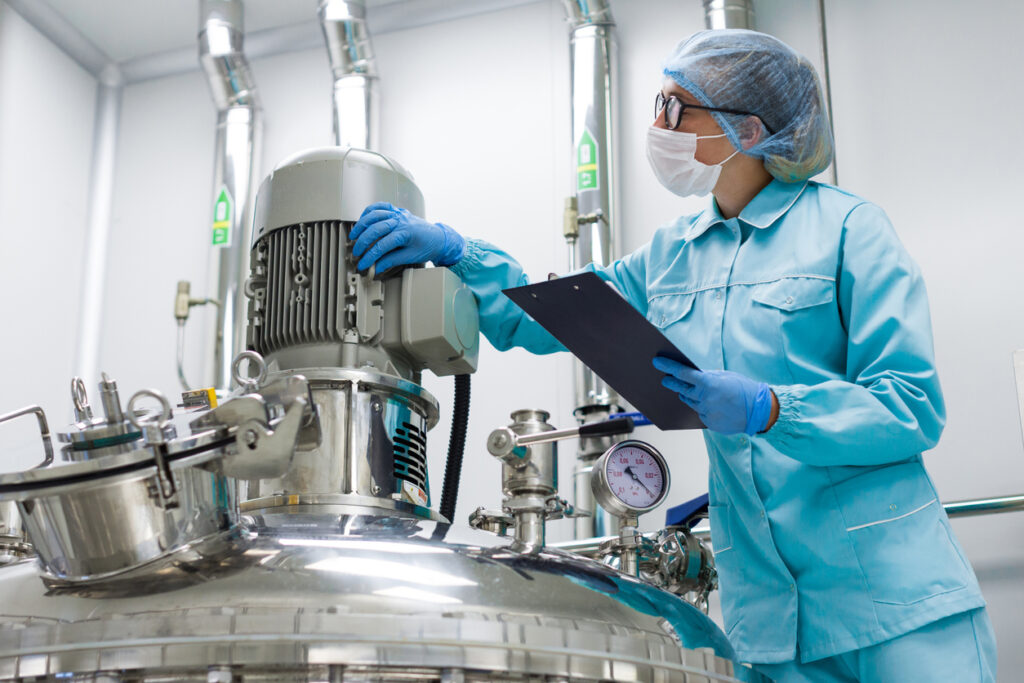At Applied Catalysts, we understand the monumental importance of catalysts in accelerating and enhancing chemical reactions. As the demand for productivity grows, efficient catalyst scale-up becomes paramount.
What is Catalyst Scale-Up?

Catalyst scale-up is the process of taking what works efficiently in a laboratory and adapting it to meet the larger industry demands. It’s more than just producing more catalysts; it’s about ensuring they work as effectively on a large scale as they do in the lab.
This need for scale-up arises from industry demands, the pursuit of efficiency, and the goal of bringing lab innovations to the market.
The Demand For Catalyst Production Scale Up

The demand for scale-up reflects not just market growth but also technological progress, environmental consciousness, economic pressures, and infrastructural developments.
- Growing Global Markets: As markets expand and consumer needs escalate, industries are compelled to produce more. To cater to these vast markets, increasing the production of catalysts is not just a choice but a necessity.
- Technological Innovations: As research and development efforts bear fruit in laboratories, the next logical step is to bring these innovations to the masses. This transition is possible only through effective scale-up.
- Environmental and Economic Efficiency: Industries today are under pressure to be both environmentally conscious and economically efficient. Scaling up allows for the optimized use of resources, reducing waste and ensuring that production processes are both green and cost-effective.
- Competitive Advantage: In a saturated market, the ability to scale up efficiently can be a significant differentiator for companies. Those who can swiftly and effectively increase production can meet market demands faster, gaining a competitive edge.
- Regulatory Push: Regulations and policy frameworks often encourage or necessitate upscaling certain environmentally friendly or efficient catalysts. Complying with these norms requires industries to focus on scale-up.
- Infrastructure Development: As countries and regions develop, infrastructure growth is parallel, leading to larger production facilities and plants. These expanded facilities naturally demand a scaled-up supply of catalysts to function at full capacity.
For industries to thrive and meet the multifaceted demands of the modern world, embracing and mastering the scale-up process is imperative.
Challenges in Catalyst Scale Up

While the importance of catalyst scale-up is undeniable, navigating the transition from the lab to industrial scale is fraught with complexities. These challenges range from technical nuances to broader economic and environmental concerns.
Take a look at some of the most common obstacles industries often face during this critical phase.
Physicochemical Properties Variations
Critical catalyst properties like surface area and porosity can vary as you scale. Such changes can have a pronounced effect on performance, often necessitating recalibrations.
Heat and Mass Transfer Issues
Problems like hotspots, flow inconsistencies, and mixing challenges can arise at an industrial scale due to differences in transport phenomena compared to the lab scale.
Economic Concerns
As you scale, costs can balloon, especially if you cannot maintain the efficiencies witnessed at a smaller scale. Large-scale operations also come with significant investments in equipment and infrastructure.
Safety and Environmental Considerations
Handling large quantities of materials presents its own set of risks. Larger reactors, more significant operations mean more considerable hazards. Additionally, with scale comes the responsibility of managing waste and emissions more effectively.
Reproducibility of Results
One of the most daunting challenges is ensuring that the catalyst behaves the same way it did in the lab. Any number of variables introduced during scaling can influence outcomes, sometimes unpredictably.
Scaling Catalyst Production: Best Practices for Success

Overcoming the hurdles of catalyst scale-up requires a thoughtful, multifaceted approach. By harnessing a combination of technology, expertise, and innovative thinking, industries can strategize for successful and efficient scale-up.
Here, we explore some proven tactics that can guide this journey.
Pilot Scale Testing
Rationale: Before diving into full-scale production, testing catalysts at an intermediary, or pilot scale, can offer invaluable insights.
Advantages: This step helps identify potential issues, streamline processes, and minimize costly mistakes during large-scale production.
Implementation: Engage in iterative pilot runs, refining the process at each stage based on feedback.
Advanced Simulation and Modeling
Rationale: Digital tools and software can simulate how catalysts will behave at larger scales.
Advantages: These simulations can predict potential challenges and offer solutions, reducing the trial-and-error aspect of scale-up.
Implementation: Collaborate with software specialists to develop or use existing modeling tools tailored for your catalysts and processes.
Designing for Scalability from the Start:
Rationale: Considering scale-up during the initial research and design phases can prevent retrofitting challenges later.
Advantages: This proactive approach saves time, resources, and reduces the risk of scalability issues in the future.
Implementation: Integrate scalability metrics and objectives into initial research protocols and design blueprints.

Collaborate With an Experienced Catalyst Production Company
Rationale: Embracing expertise can significantly de-risk and streamline the scale-up process, and at Applied Catalysts, we bring decades of specialized experience to the table.
Advantages: Partnering with us ensures that you’re leveraging top-tier knowledge, proven methodologies, and cutting-edge research in the field of catalyst scale-up. Our team, renowned for its excellence, can provide insights and catalyst production services tailored to your unique requirements.
Implementation: Engage with Applied Catalysts at the early stages of your scale-up journey. Our consultation, hands-on support, and collaborative approach will guide you seamlessly through every challenge and milestone.
Continuous Monitoring and Feedback Loops
Rationale: Real-time monitoring ensures that the scaled-up process remains efficient and any deviations are promptly addressed.
Advantages: A continuous feedback mechanism helps maintain consistent product quality and swiftly addresses issues before they escalate.
Implementation: Invest in state-of-the-art monitoring tools and develop protocols for regular checks, reviews, and iterative refinements.
Training and Skill Development
Rationale: As processes change or expand, ensuring the workforce is equipped with the necessary skills becomes crucial.
Advantages: A well-trained team can effectively handle the intricacies of scale-up, reducing errors and enhancing productivity.
Implementation: Organize regular training sessions, workshops, and certifications to keep the team updated on the latest techniques and best practices.
Safety and Environmental Protocols
Rationale: With scale-up, the potential risks of handling large quantities of materials increase.
Advantages: Establishing stringent safety and environmental protocols ensures the workforce’s well-being and reduces environmental impact.
Implementation: Conduct risk assessments, establish emergency response plans and ensure all processes align with environmental standards.
Why Choose Applied Catalysts For Your Scale Up Needs?

When it comes to scaling up, your choice of partner can significantly influence the success and profitability of your endeavors.
With Applied Catalysts, you’re not just getting a service provider; you’re gaining a partner committed to propelling your projects to unparalleled heights.
Here’s why Applied Catalysts should be your go-to choice.
Catalysts Versatility
With a comprehensive range spanning from Activated Carbon Monolith Catalysts to Metal Oxide Catalysts, we ensure that you have access to the perfect catalyst solution tailored to your needs.
Cutting-edge Systems
Our Modular Process Systems are designed to integrate seamlessly into a variety of industrial setups, ensuring smooth operations and top-tier results.
Comprehensive Services
From catalyst testing to process development, our holistic suite of services ensures that every aspect of your catalyst needs is meticulously addressed.
Deep Industry Knowledge
Whether you’re in biorenewables, pharmaceuticals, or specialty chemicals, our profound understanding of diverse industries guarantees that our solutions resonate with your specific requirements.
Custom & Industry Catalyst Expertise
Our track record in custom catalyst manufacturing, backed by a team of knowledgeable chemists and researchers, means that even your most complex design and processing needs are met with precision and efficiency.
Strategic Partnerships
In collaboration with top-tier Engineering Firms and Systems Manufacturers, we offer unparalleled process flowsheets and system scale-ups, ensuring your projects always have a competitive edge.
Collaborate with the experts at Applied Catalysts and harness the power of world-class catalyst technology for your industry. Contact us today to discover how we can accelerate your Scale Up success.
Recent Posts
Regenerative Thermal Oxidizer (RTO) to RCO Conversion
Regenerative thermal oxidizers (RTOs) are a leading solution for controlling volatile organic compounds (VOCs) and hazardous air pollutants (HAPs) from industrial air pollution sources. These systems can achieve up to…
Read MoreCutting Costs and Emissions: A Dual Approach for Spark Ignition Engine Manufacturers
Balancing emission reduction with cost management is crucial in spark ignition engine manufacturing. As global environmental regulations become increasingly stringent, manufacturers are compelled to adopt innovative solutions that meet air…
Read MoreCatalyst Testing Tips: Determining Activity in VOC Catalysts
VOC catalysts are pivotal in reducing harmful emissions released during industrial processes, directly influencing air quality and compliance with stringent environmental regulations. However, the effectiveness of these catalysts hinges not…
Read More

